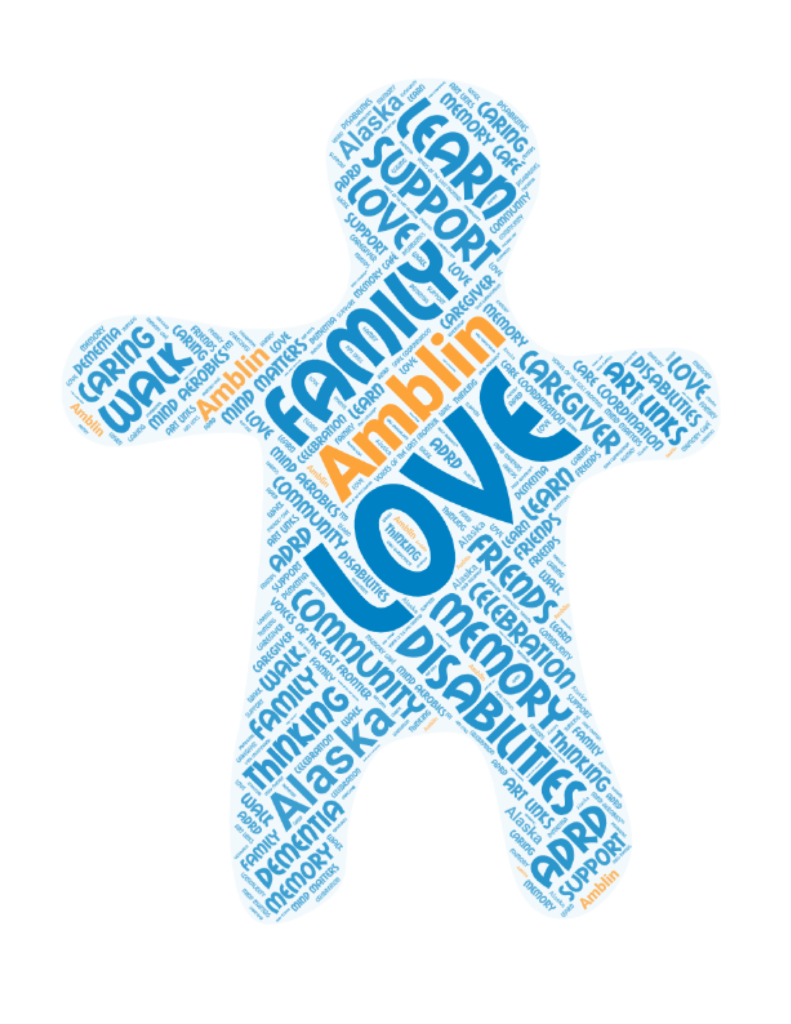Communication Tips

Communication is complex and has many factors. The following are guidelines to consider.
Remember to
- Meet the person in the time/era they are in. For example, if you are caring for your mother and she believes you are her sister, then go with it. Unless there is a safety concern, there is no need to keep reorienting the individual to your reality. It may only frustrate them.
- Speak slowly and clearly using short simple sentences and familiar words. Do not expect a quick response. Give the person time to process the information.
- If it is necessary to repeat statements, use the same words. Do not rephrase sentences Use fewer, more concrete words.
- The tone of your voice and facial expressions are as important as what you say. Use a normal tone of voice and a calm manner. Do not use “baby talk.” Persons with dementia can be sensitive to body language as well as tone of voice even if they can’t understand what is being said.
- Stand in front or in the direct line of vision of the person. Be sure you are connected with them before you do anything else. Touching an arm or shoulder gently can be helpful to get or keep attention.
- Present only one idea at a time. Try not to give too much information in one sentence.
- Use gestures and visual cues or aids to get your message across. Try using more than one of the senses to communicate, such as touching as well as talking.
- Avoid certain types of questions whenever possible, such as quizzing the person on names of family members. Avoid asking “do you remember…” Not knowing the answer embarrasses the person, this only reminds them that they don’t know. It may be helpful to cue the person with the necessary information, such as supplying the names or saying “I remember when we…” or “Oh look. Here’s uncle Albert.”
- Only offer simple choices (e.g. “would you like orange or apple juice?” instead of “what would you like to drink?”).
- Discuss only concrete actions and objects. Avoid pronouns such as “she, he, and they.”
- Use direct statements to initiate action, such as “It’s time to take a bath,” or “Let’s get dressed now.” Avoid asking if they want to talk a bath or shower.
- Understand the person with dementia may say one word and mean another. You may have to guess at the correct meaning. Try to clarify your guess with the person before assuming the correct meaning.
- Communicate with the person as much as possible; however, a constant stream of conversation is neither helpful nor necessary.
- Do not assume the person with dementia can understand and act on messages, either written or verbal. Just because they can repeat your words, does not mean they understand.
Golden Rules of Dementia Care
Remember not to argue
Educate yourself and others. Learn about dementia and how to manage it. This can help you know what to expect throughout the course of the disease and help you make better decisions about how to help care for your loved one.
Respect and empathize with the person’s feelings

- “This must be frustrating, but I think you’ll feel better in clean underwear.”
- “I can see you’re upset. I’d be upset too if I thought someone had taken my money.”
- “It’s upsetting when something gets lost. Let me help you look for your wallet”.
- “I’d be upset too if I didn’t get my lunch. Let me see what I can find in the kitchen”.
- “You must miss your home. Tell me about it. Was it large?”
Be creative
- Appeal to an absent third party, an authority, if you’re having problems.
- “The laundry lady is waiting to wash your sheets.”
- “I hear the inspection team is coming today, so we’d better get this floor clean.”
- “Let me help you to the bathroom before your daughter arrives.”
- Short term memory loss may be used to your advantage. Wait 10 minutes and try your desired activity
again.- Individuals with dementia sometimes forget an event within five minutes.
- Very few things must be done immediately.
- Approach the problem from a different angle when you return.
- Use humor to cajole cooperation.
- “I guess I’ll have to take my bath first” often produces competitive cooperation.
- “You look so angry. I brought my smile with me just for you!”
- “The newspaper said they’re planting rubber trees along the highway to prevent traffic crashes. Isn’t that the silliest joke you ever heard?”
- Use distraction—try to rely on concrete things rather than abstract ideas.
- “I can’t leave now; will you go for a walk with me after lunch?”
- “Have you seen the rabbit outside? Jan told me they’re cleaning his cage.”
- “They’re calling your floor to lunch. Let’s get finished so you can go eat.”
Avoid Negative Responses
- Do not become defensive.
- Do not ask questions that require explanations, especially “why” questions.
- Do not belittle or talk down to an adult with dementia; do not treat him or her like a child.
- Do not quiz a person with memory loss.
- Do not disagree, argue or offer opposing ideas.
How we can help
- Individual and family consultations.
- Caregiver support groups by telephone or video conference (a great way to learn about local resources)
- Community Resource Guides or setup a consultation for further community referrals.
- Brochures and handouts
- Lending library and recommended books/videos/websites
- Educational programs, seminars and state-wide webinars on relieving stress for caregivers, family consultations, financial and legal planning, and Savvy Caregiving and more.
- Printable Fact Sheets
- Care coordination services
- Assistance to find respite services, chore services, or consumer-directed personal care attendant services.
- Mini-grant funds for items that will help your loved one
Navigation
Alzheimer’s and Dementia Info Pages
- 10 Steps in Planning for the Future
- 10 Warning Signs
- About Alzheimer’s Disease
- About ADRD
- Activities for Adults with Dementia
- Assisted Living Homes
- Caregiver Checklist
- Combativeness
- Communication Tips
- Diagnosis
- Dining & Dementia
- Driving and Dementia
- Introducing Services
- Treatment & Medications
- Medications & Dementia
- Normal Aging vs. Alzheimer’s
- Prevention
- Strategies for Wandering
- Stages and Symptoms
- Talking with Children about Alzheimer’s
- Traveling with Alzheimer’s
 Make a Payment
Make a Payment



